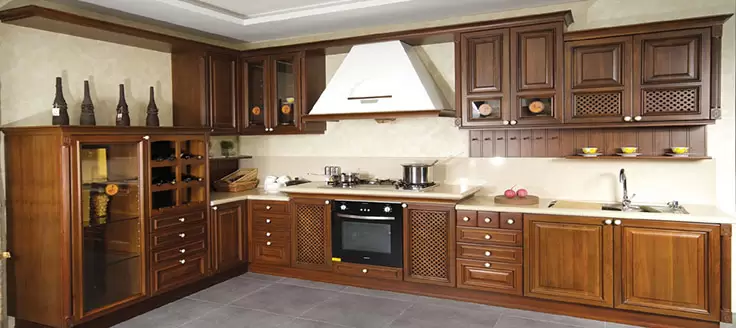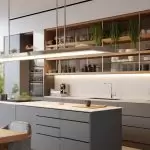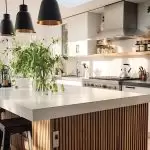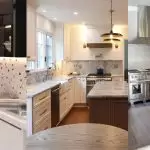While designing or renovating a home, the kitchen is the primary focus due to the integral role of the space in ensuring a good quality of life for the people. The kitchen is the space that is the centre of culinary creations and one of the most used spaces in the house. We all want a modular kitchen that makes cooking easier and gives a sense of durability and visual appeal to the interiors.
Post your Requirement
The modular kitchens are the incredible structures that are basically factory-made modules that can be designed and assembled in a variety of ways to suit the different sizes, functionality, and durability needs of the people. The modular kitchens have become a popular choice among the people due to their smart features and visual appeal. However, you need to choose a reliable material for your modular kitchen designs to impart strength, durability, and efficiency in the long run.
What Are the Common Materials for Modular Kitchen Designs in India?
There are a plethora of material and finish options available for the modular kitchen in India, each with its own specific set of features that make it a great choice. Some of the common materials for modular kitchen designs include the following:
1. Stainless Steel
Stainless steel is one of the newest materials for kitchen cabinets in India, particularly gaining prominence in the post-pandemic era. With its incredible anti-fungal and antimicrobial properties, the material has steadily infiltrated the Indian market. The material is highly resistant to heat, water, and stains and comes with a sleek appearance, durability, and ease of maintenance, thereby being a practical choice for modular kitchen designs. The material is easy to clean and ensures durability in structures.
- Pros: Highly durable, resistant to water, termites, fire, and rust; hygienic and easy to clean.
- Cons: Expensive, can get scratches and dents, and limited color options.
- Best for: High-end kitchens, commercial kitchens, and modern and contemporary designs.
2. Wood
The real wood proves to be an expensive material in the present era, but can be used for the creation of luxurious modular kitchen designs with the warmth of natural material and the grace of lavish designs. You can go for options such as teak, maple, oak, and others that come with superior strength and resilience, along with the remarkable ability to withstand heat and moisture. The wooden modular kitchen designs have become a popular idea due to their ability to ensure reliable performance, even with long-term performance, and a world of options in terms of customization. However, the wooden kitchen requires regular maintenance and proper sealing for superior longevity.
- Pros: Premium appearance, natural texture, long-lasting, strong.
- Cons: Expensive, prone to termite attacks, requires regular maintenance.
- Best for: Traditional and luxurious kitchen designs.
3. Commercial Plywood
Known to be one of the best materials for modular kitchens, plywood is a kind of engineered wood that is made by layering thin sheets of wood veneers and gluing them with adhesives to create products that are equipped with remarkable dimensional stability and effective resistance to warping or cracking. It is slightly more expensive than other potential options, but the standards of strength and robustness it offers make up for the value. The material also comes in water-resistant variations such as Boiling Water Resistant Ply and Moisture Resistant (MR) Ply, which perform well in kitchens. You can get the laminates finished with commercial plywood for an excellent look and unmatched durability.
- Pros: Strong and durable, moisture-resistant variants available (BWP/BWR plywood), good for long-term use.
- Cons: Expensive compared to MDF or particle board; needs a laminate finish for aesthetics.
- Best for: Mid to high-budget kitchens, widely preferred material.
4. MDF Boards
The MDF or the Medium-density fiberboard (MDF board) refers to a kind of composite wood material that is manufactured by breaking down different wood fibres and binding them together with resin or adhesives. MDF boards are also a type of engineered wood and offer the benefit of a smooth finish and a wonderful texture. The material is also known for its effective resistance to moisture compared to solid wood and is less prone to expansion or contraction. The material is prone to water damage and thus needs to be properly sealed. You can pair the material with a laminate for a beautiful appeal and a unique finish.
- Pros: Smooth surface for painting and laminating, affordable, and available in various finishes.
- Cons: Less durable than plywood, not water-resistant, can swell if exposed to moisture.
- Best for: Budget-friendly kitchens, interior shutters, and decorative panels.
5. Particle Board
One of the cheapest options among the high-quality modular kitchen materials, particle board is another kind of engineered wood product that is manufactured with wood chips, sawdust, and resin. The material might not be as durable as solid wood or plywood, but it is a great choice with its ability to support heavy weight and ensure efficiency in the kitchen used for light cooking or small families. You should protect the structural integrity of the structures with proper sealing and maintenance, thereby ensuring long-term durability in kitchens.
- Pros: Cheapest option, lightweight, eco-friendly (made from wood waste).
- Cons: Weak structure, not moisture-resistant, not very durable.
- Best for: Low-cost kitchens, temporary setups, rental properties.
What is the Price Range Of Different Modular Kitchen Materials in India?
Price is one of the considerable factors that determine our choice of the right material for our modular kitchen. The right material should ensure a satisfactory level of visual appeal and long-term functionality while serving to be a value-for-money investment for the consumers. You should consult many modular kitchen manufacturers for expertise and detailed guidance about the right material, finishes, and features for your modular kitchen. While there is a wide range of factors that influence the cost of the common material for modular kitchens in India, we have provided a rough estimate below for a proper understanding.
|
Modular Kitchen Materials |
Materials Cost |
| Stainless Steel | ₹2,500 – ₹6,000 per sq. ft. |
| Solid Wood | ₹2,000 – ₹5,000 per sq. ft. |
| Plywood (BWP/BWR Grade) | ₹1,500 – ₹3,500 per sq. ft. |
| MDF (Medium Density Fiberboard) | ₹900 – ₹2,000 per sq. ft. |
| Particle Board | ₹600 – ₹1,500 per sq. ft. |
Additional Costs To Consider
- Finishes (Laminates, Acrylic, PU, Veneer): ₹150 – ₹1,500 per sq. ft.
- Hardware & Accessories (Soft-close hinges, drawer channels): ₹5,000 – ₹50,000, depending on quality.
- Countertop (Granite/Quartz/Marble): ₹250 – ₹5,000 per sq. ft
Choose The Best Material For Modular Kitchen Designs for Long-Term Efficiency
A modular kitchen is a highly customizable option that can be tailored to meet your specific storage, functional, and aesthetic needs. However, the first step is choosing the right material for the structures, as that will impart the strength and durability. Options like marine plywood and stainless steel are known to be top choices for the purpose with their effective resistance to water damage and ability to prioritize hygiene. You should consider your specific cooking habits and consult a reputed modular kitchen manufacturer to create a modular kitchen that is stylish, functional, and long-lasting.























Post A Comment